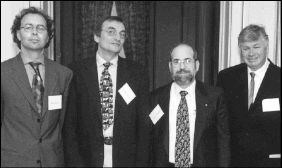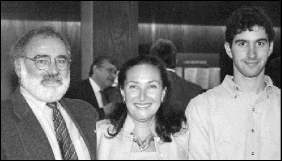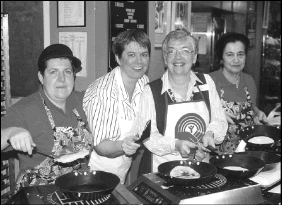
|

|
|
|
|
| | VOLUME 29, NUMBER 8 | WEDNESDAY, OCTOBER 28, 1998 | ISSN 1199-5246 | | |
|
|
||
|
|
DIALOGUE ON GERMANY: Scholars (left to right) Kurt Hübner, Frank Unger, Mark Webber, and Volker Gransow spoke at a round table discussion hosted by York's Canadian Centre for German and European Studies.
The recent German election, which saw Chancellor Helmut Kohl and his Christian Democratic Union Party go down to defeat against Social Democrat rival Gerhard Schröder, was the topic of a round table discussion hosted by York's Canadian Centre for German and European Studies. The event, titled "Germany After the Elections: Impacts and Implications," took place on Oct. 6 at the University Club of Toronto. York University humanities professor Mark Webber, co-director of the Centre for German and European Studies, led the discussion. Webber was the sole Canadian invited by the German Academic Exchange Service to be an election observer in that country. He provided the gathering of academic and business leaders with an analysis and first-hand account of the elections, and speculated on its impact for Canada. "Kohl lost," Webber reflected, "because he was a candidate." He went on to explain that this election was not issues-based, but was instead centered on personalities. Kohl had simply been in office too long, Webber said. Had Kohl's party offered the German people a new leader for election, the election results would have been better for the party, Webber said. "This was really a referendum," he said. "The people were asked if they wanted Kohl again, yes or no....Obviously, even after 16 years of stability, the electorate thought it was time for a change." Looking at the election in a wider perspective, Webber said he believes that the real winner was democracy. The voter turnout of 82 per cent could be seen as a strong rejection of right-wing extremism, Webber said, intimating that the high turnout could be interpreted as the result of the public momentum to get Kohl out of office. As for the policies of the new leader, Webber said he expects to see a new emphasis on domestic policies, on culture and education, and on European Union (EU) issues. Canada does not seem to be on the German agenda, he said. While government officials assured him that there were no problems with Germany's relationship with Canada, Webber said simply, "We do not figure in their view of the world." Frank Unger, a political science professor at the University of British Columbia, spoke on the impact of the elections on Germany's foreign policy. Unger is an expert on East-West relations and on comparative North American-German issues. He has taught at the Free University of Berlin, and was the acting director of the Institute for Political Science at the Humboldt University in former East Berlin. Unger agreed with Webber's analysis of foreign policy. While certain that Schröder will not revoke anything initiated by Kohl's government, Unger said he expects to see a German move toward enlargement of the EU, especially an initiative to enlarge the EU's core to include Tony Blair's British government. Unger also said he foresees a more distinct European identity and a younger German government less inhibited with criticism toward the United States. Another panel member, Kurt Hübner, a visiting professor of German studies at York University, spoke on the implications for international trade. Hübner is an economist and political scientist specializing in the impact of globalization on the German economy and East-West relations. Hübner also said he sees the EU as a priority interest for the German government. He reminded the audience that several influential countries in the European Union have now elected social democratic governments, mentioning specifically Britain, France, Germany and Sweden. He said he believes that these governments will work together to influence EU fiscal policies to strengthen the organization both economically and politically. He expects there will be little concern with North America except in the areas of import/export. Volker Gransow, a visiting professor of political science at York, provided a critical analysis of Germany's political future as a conclusion to the discussion. Gransow also teaches in the Schulich School of Business' International MBA program. He is an expert on the former German Democratic Republic and on German unification. He has taught at Stanford, Berkeley and the University of Toronto. Gransow summarized by saying that Schröder's government will focus on both continuity and change. He reminded the audience that this is a new generation of leaders with new ideas that they wish to build on the old, and that Canada would do well to concentrate on these changes to find areas of commonality. He suggested that Canadians watch for the results of the upcoming German provincial elections, as well as various European elections, for further indication of the political and economic changes that will occur in the EU. York's Dean of Arts, George Fallis, congratulated the panel, saying it was a testament to the Canadian Centre for German and European Studies that it could provide a deep level of information and understanding that is rarely found in the general media. The Canadian Centre for German and European Studies is a Canada-wide research and teaching resource, focusing on contemporary Germany in its European context. Established after a nationwide competition among Canada's foremost universities, the centre is a cooperative initiative of the German Academic Exchange Service (DAAD), the Université de Montréal and York University. The centre, with offices in both Montreal and Toronto, was officially inaugurated in November 1997. |
|
|
|
Madam Justice Rosalie Abella, the guest speaker at this year's Barbara Betcherman Lecture, is pictured at York with her husband, history professor Irving Abella, and their son, Zachary Abella, a York University student.
Students should "reawaken the consciousness of human rights" and follow the spirited actions of Barbara Betcherman, according to Madam Justice Rosalie Abella of the Ontario Court of Appeal. Abella was at York University to deliver the ninth Barbara Betcherman Memorial Lecture, which is held to celebrate the late Osgoode Hall Law School graduate who made outstanding contributions to social change and equality before her untimely death in 1983. Barbara Betcherman became a federal prosecutor, served on the Royal Commission investigating alleged police brutality, co-founded the Toronto Rape Crisis Centre, worked as director of legal research on the CBC's Ombudsman program, and was a best-selling author. The Barbara Betcherman Memorial Lecture promotes public discussion about women and the law, including sex equality, feminist theory, and applied legal research in areas of law with a significant impact on women. Abella, a personal friend of Betcherman, delivered a lecture titled "A Generation of Human Rights: Looking Back to the Future." An estimated 150 people attended the lecture which focused on the progress of the human rights movement over the last several decades a movement that was supported by the strength and courage of women such as Betcherman. Abella has a distinguished record of contributions to the law and to her community: She served as Chair of the Ontario Law Reform Commission, (1989-1992), Chair of the Ontario Labour Relations Board (1984-1989), and she was the first Jewish woman judge in Canada. As well as offering a time-line for the development of human rights in Canada since the Second World War, Abella suggested that human rights and women's equality struggles in the 1970s and the entrenchment of the Canadian Charter of Rights and Freedoms in the 1980s have successfully expanded human rights and social tolerance. Yet she concedes there is still a long way to go. In the 1950s, there was an essence of conformity, and compliance was expected, she said. "Undemocratic, Communist, and Jewish were often interchangeable terms in those days," Abella said. "Is it any wonder we sought refuge in like-minded people?" In the 1960s and 1970s, feminist and political activism brought about many initiatives for human rights, she said. It was not until Abella first began interacting with clients that she saw first hand the discrimination and social inequality that permeates society. She reports, "as a result, in the 1970s, there was a tidal wave of reform, particularly in family law." With the introduction of the Charter of Rights and Freedoms in the 1980s, individual rights became constitutionally protected, she said. Yet the inclusion of a notwithstanding clause allows some rights and freedoms to be overridden for the sake of regional and provincial diversity, she said. "I am a Charter fan," Abella said. "However, the Charter is ideologically schizophrenic." On the one hand, she said the Charter protects the rights of the individual, and yet, on the other hand, the notwithstanding clause allows for the rights of groups or communities, mainly linguistic groups, to override the rights of individuals. "Unlike the U.S., we in Canada were never concerned with rights of the individual [as the top priority]. Rather, we were concerned with maintaining the division between the English and the French," she stated. Abella suggested that a new pluralism is directing the cultural environment in Canada, and she said that when the Charter was introduced to the world of "isms" within a pluralist society, rights truly became capitalist (where one is motivated by self interest.) "We started to think that all rights were created equal, including those of discrimination," she said. Increased awareness of the Charter has caused some individuals to criticize groups who use the Charter to correct what they see as historical disadvantages or discrimination against them, she said. This emphasis on rights had a predominant effect on how people perceive equality and rights, in contexts such as affirmative action programs, she said. "We promote human rights, [and] we protect civil liberties, but civil liberties cannot trump human rights," said Abella. Since the 1970s, when Abella graduated from Osgoode Hall with only five other women, there have been three female Supreme Court Justices and two female federal Justice Ministers. Having seen women become professionals, having seen gay and lesbian pride parades, having seen the construction of ramps for the disabled, and having seen aboriginal invited to constitutional discussion, Abella said she is optimistic about the future of human rights. She encouraged the students in the audience to "reawaken the consciousness of human rights. We still have a long way to go, but we have come a long way, and we can take no small amount of pride at the distance travelled," she said. Sandra Guiry is a master's student of political science at York University. |
|
|
|
HAVE SOME BREAKFAST: Serving up the pancakes at the United Way breakfast in the Central Square cafeteria are (from left): Angela Scoppelliti, cafeteria employee; Cora Dusk, assistant vice-president (student affairs); Ellen Hoffmann, associate vice-president (academic information services) and university librarian; and Giacinta Lucentini, cafeteria employee.
PASS THE PANCAKES! Norm Crandles, director of food, beverage and hospitality services, waits for a pancake from Harriet Lewis, university secretary and general counsel, and Phyllis Clark, vice-president (administration) at the United Way pancake breakfast. Other celebrity chefs, including Gary J. Smith, vice-president (university advancement) and President Lorna Marsden, can be seen in the background.
Organizers of the United Way fundraising pancake breakfast held at York said they were thrilled with the turnout and with the support from members of the York community. The event was held on Oct. 9 in the Central Square cafeteria, and it launched York University's United Way campaign for this year. Pledge forms are now being distributed, and community members are invited to be generous in their support of the United Way. More than 600 staff, faculty and students turned out for the breakfast, which raised $1,376 for the United Way, said Gillian Sewell, York's United Way campaign coordinator. "The United Way kickoff breakfast went fantastically," said Sewell. "We were at maximum capacity, and we could not flip pancakes fast enough to keep up with the demand. It was a huge success to raise that much money, especially considering that it was an inaugural event." York's goal this year is $115,000 and an employee participation rate of 17 per cent. To reach this goal, donations from 508 people are needed. Donations can be directed to a specific charity or agency of United Way. Pledge forms have been distributed to departments around the University, and campaign organizers are urging everyone to make a donation to the United Way." York University President Lorna Marsden challenged Ryerson President Claude Lajeunesse to see who could flip the most pancakes to raise funds for the United Way. Marsden greeted members of the York community as she flipped her pancakes, and laughed when she was asked if her batch should be called "President's Choice." Several other York administrators also donated their time to serve as celebrity chefs at the event. Deborah Hobson, vice-president (enrolment & student services) said, "It's great to see everyone out here at this wonderful community event. There's been a steady flow of people from all areas of the university, so this really is a cross-campus event." Several administrators said they felt that Harriet Lewis, university secretary and counsel, was the most skilled flipper of pancakes. "She can flip three at a time," laughed Phyllis Clark, vice-president (administration). "It's a great cause, great fun, and a great day," said Gary J. Smith, vice-president (university advancement.) "Sometimes the demand is outstripping the supply of pancakes here, but it's fabulous to see everyone out supporting the United Way." The diners also had positive comments to make. Al Scragg, president of the York University Staff Association, said, "I think it's good to see the senior administration addressing its community responsibility with this. York has traditionally responded to the needs of the community, and this is just another example of us doing that again." "I'm glad to see such a good turnout," said Bev Altberg, a staff member in the Faculty of Environmental Studies, who is the United Way contact person for her area. "I'm here to support the United Way, and I like the idea of York competing with Ryerson," said Peter White, a PhD student in physics and astronomy. "A little healthy competition can be good for the soul!" The results of the pancake-flipping competition revealed that Ryerson edged out York, raising $1,666. Sewell said that, "Unfortunately, Ryerson did a little better than us, but they were serving pancakes at five different locations. Still, by no means should we be disappointed here at York," said Sewell. "Everyone had a good time and good food, and they came out in support of a good cause. We want to give special thanks to Sodexho Marriott and their very enthusiastic staff, as well as to all of our VIP chefs who generously donated their time and effort. We're thrilled with the results." Cindy Gorenkoff of the Ministry of Education and Training's university branch served as the Loan Representative from the United Way to York University. She said the turnout at the breakfast was "wonderful. We want people to think about giving in order to help the United Way of Greater Toronto Area reach its overall goal of $58.2 million." |
|
|
|
Call for nominations for honorary degrees The Senate Sub-Committee on Honorary Degrees and Ceremonials is now accepting nominations for honorary degree recipients for 1999 and future years. The general criteria established by the Senate for the selection of honorary graduands stipulate that the candidate must present one or more of the following achievements: has attained eminence in his or her field; has served Canada, Ontario, York University or the local community in a significant manner; has provided a benefaction to the University; is a person whose attributes of character and contributions to society are worthy of emulation by York graduands. Nomination forms are now available. To obtain a form, contact the sub-committee secretary, Nancy Accinelli, Office of the Vice-President, S932A Ross, (416) 736-2100, ext. 22211 (email: nacc@yorku.ca). A nomination file should include the completed form, a nomination letter, the curriculum vitae or career summary of the nominee, plus supporting letter(s). The file should address the question of the nominee's suitability for an award from York University by making reference to the general criteria. While nominations are accepted throughout the year, the sub-committee encourages nominators to submit a file by the end of November so that candidates may be considered early for the series of convocation events in 1999. * * * United Nations official Sadako Ogata comes to York The United Nations High Commission for Refugees is hosting an open forum with Sadako Ogata, UN High Commissioner for Refugees, on Friday, Nov. 6. Ogata will be speaking about "Global Challenges Facing the United Nations High Commissioner for Refugees," from 2:30 to 3:30 p.m. in the Senate Chamber, N940 Ross Building. The event is free and open to the public. For more information, call the Centre for Refugee Studies at (416) 736-5663. * * * Mary Robinson to speak on human rights Mary Robinson, the United Nations High Commissioner for Human Rights, will be coming to York on Tuesday, Nov. 24 to speak on "Implementing Human Rights: The Next 50 Years." The lecture will take place in Winters College Dining Room from 10:30 to 11:30 a.m. For more information, call the Centre for Refugee Studies at (416) 736-5663. * * * Quebec playwright, director coming to York Pol Pelletier, a renowned Montreal playwright, director and actor, will be speaking and giving a performance at York University on Monday, Nov. 2 from 4:30 to 6:30 p.m. in the Burton Auditorium, Faculty of Fine Arts. Pelletier was part of the movement in which theatre helped to galvanize francophone opposition to anglophone dominance during Quebec's Quiet Revolution. She will share her unique insights into the pioneering role of women in Québécois theatre and culture during her address, An Encounter with Pol Pelletier: Trans/Forming Culture: From "French-Canadian" to "Québécoise." It is part of a series of free public events organized by the Robarts Centre for Canadian Studies. The series is titled Theatrical Trans/Formations, and continues through the year. Some of Canada's best known theatre and dance practitioners will discuss, and in some cases show, how theatre has transformed Canadian culture. |
|
|
|
The following is a synopsis of the meeting of September 24, 1998, at which Senate: * heard remarks from President Marsden describing recent initiatives at the University various orientation events, the University's new Web site, congratulations to faculty on recent honours, the success of the National Campaign, plans for York's 40th Anniversary in 1999, efforts to inform the government of student and faculty concerns, and the reorganization of the Board of Governors; * received the Executive Response to the Task Force on Research Centres; * received preliminary report on the 1998-99 enrolments from the Vice-President (Enrolment & Student Services); * referred questions about Presidential Regulations #2 and #3 (concerning student conduct at the University) to the University Discipline Tribunal Committee; * learned that a proposed York-University-Sheridan College Joint Degree Programme in Design is continuing to progress through the review and approval process; * noted the 1999-2000 to 2001-2002 Call for Plans; * approved a series of Honours (double major) programs at Glendon College; * approved a Bachelor of Administrative Studies (Specialized Honours) Business Research Option Atkinson College; * noted the establishment of Certificate in Working with Children and Families in Distress (Non-Degree); * approved the proposal that students not be academically penalized for failure to attend classes, practica, tutorials or labs on October 16, 1998 and given reasonable alternative access to materials covered that day so that they may participate in planned student protests calling for a tuition freeze and increased student funding. |
|
| | Current Issue | Previous Month | Past Issues | Rate Card | Contact Information | Search | |
 by Beverley Else
by Beverley Else
 by Sandra Guiry
by Sandra Guiry

 by Mary Ann Horgan
by Mary Ann Horgan